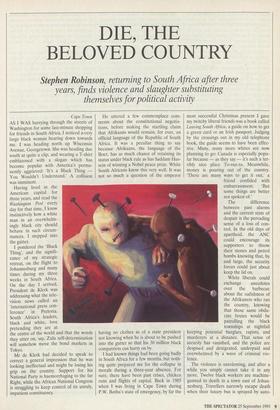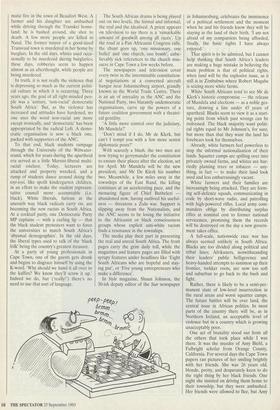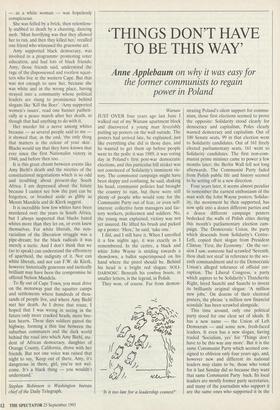DIE, THE BELOVED COUNTRY
Stephen Robinson, returning to South Africa after three
years, finds violence and slaughter substituting themselves for political activity
Cape Town AS I WAS hurrying through the streets of Washington for some last-minute shopping for friends in South Africa, I noticed a\very large black woman bearing down towards me. I was heading north up Wisconsin Avenue, Georgetown. She was heading due south at quite a clip, and wearing a T-shirt emblazoned with a slogan which has become popular with America's perma- nently aggrieved: 'It's a Black Thing — You Wouldn't Understand.' A collision was imminent.
Having lived in the American capital for three years, and read the Washington Post every day for that time, I knew instinctively how a white man in an overwhelm- ingly black city should behave in such circum- stances. I stepped into the gutter.
I pondered the 'Black Thing', and the signifi- cance of my strategic retreat, on the flight to Johannesburg and many times during my three weeks in South Africa. On the day I arrived, President de Klerk was addressing what the tele- vision news called an 'international press con- ference' in Pretoria. South Africa's leaders, black and white, love pretending they are at the centre of the world and that the words they utter on, say, Zulu self-determination will somehow move the bond markets in Tokyo. Mr de Klerk had decided to speak to correct a general impression that he was looking ineffectual and might be losing his grip on the country. Support for his National Party is haemorrhaging to the far Right, while the African National Congress is struggling to keep control of its unruly, impatient constituency. He uttered a few commonplace com- ments about the constitutional negotia- tions, before making the startling claim that Afrikaans would remain, for ever, an official language of the Republic of South Africa. It was a peculiar thing to say because Afrikaans, the language of the Boer, has as much chance of retaining its status under black rule as has Saddam Hus- sein of winning a Nobel peace prize. White South Africans know this very well. It was not so much a question of the emperor having no clothes as of a state president not knowing when he is about to be pushed into the gutter so that his 30 million black compatriots can hurry on by.
I had known things had been going badly in South Africa for a few months, but noth- ing quite prepared me for the collapse in morale during a three-year absence. For sure, there have been past crises, chicken runs and flights of capital. Back in 1985 when I was living in Cape Town during P.W. Botha's state of emergency, by far the
most successful Christmas present I gave my twitchy liberal friends was a book called Leaving South Africa, a guide on how to get a green card or an Irish passport. Judging by the crossings out in my old telephone book, the guide seems to have been effec- tive. Many, many more whites are now planning to go: Canada is especially popu- lar because — as they say — it's such a ter- ribly nice place To-run-to. Meanwhile, money is pouring out of the country. 'There are many ways to get it out,' a friend confided with
embarrassment. 'But some things are better not spoken of.'
The difference between past alarms and the current state of despair is the pervading sense of a loss of con- trol. In the old days of apartheid, the ANC could encourage its supporters to throw their stones and petrol bombs knowing that, by and large, the security forces could just about keep the lid on.
White liberals could The violence is unrelenting, and after a while you simply cannot take it in any more. Twelve black workers are machine- gunned to death in a town east of Johan- nesburg. Travellers narrowly escape death when their luxury bus is sprayed by auto- matic fire in the town of Beaufort West. A farmer and his daughter are ambushed while driving through the Transkei home- land; he is bashed around, she shot to death. A few more people are killed in Natal. The former mayor of a good-sized Transvaal town is murdered in her home by burglars. In the old days, whites used occa- sionally to be murdered during burglaries; these days, robberies seem to happen almost as an afterthought, while people are being murdered.
In truth, it is not really the violence that is depressing so much as the current politi- cal culture in which it is occurring. Three years ago, the goal of all right-minded peo- ple was a 'unitary, 'non-racial' democratic South Africa'. But, as the violence has increased and attitudes have hardened, no one uses the word non-racial any more except ironically, and 'democratic' has been appropriated by the radical Left. A demo- cratic organisation is now a black one, packed with supporters of the ANC.
To that end, black students rampage through the University of the Witwater- srand, which for years during the apartheid era served as a little Marxist-liberal multi- racial enclave. Today, lecturers are attacked and property wrecked, and a rump of students dance around doing the toyi-toyi, like spoilt kindergarten children, in an effort to make the student represen- tative council more accountable (i.e. black). White liberals, furious at the uncouth way black radicals carry on, are becoming the new racists in South Africa. At a cocktail party, one Democratic Party MP explains — with a curling lip — that the black student protesters want to force the universities to match South Africa's 'abysmal demographics'. In the old days, the liberal types used to talk of the 'black folk' being the country's greatest treasure.
At a party of young professionals in Cape Town, one of the guests gets drunk and begins to disgrace himself by using the K-word. 'Why should we hand it all over to the kaffirs? We know they'll screw it up.' Indeed we do, but ('really!') there's no need to use that sort of language. The South African drama is being played out on two levels, the formal and informal, the real and the idealised. A priest appears on television to say there is a 'remarkable amount of goodwill among all races'. Up the road at a Pan Africanist Congress rally, the chant goes up, 'one missionary, one bullet' and 'one church, one bomb', unbe- lievably sick references to the church mas- sacre in Cape Town a few weeks before.
The newspapers and television cover every twist in the interminable constitution- al negotiations at a converted aircraft hangar near Johannesburg airport, grandly known as the World Trade Centre. There is an air of unreality as the ANC and the National Party, two blatantly undemocratic organisations, carve up the powers of a future coalition government with a theatri- cal gentility.
'A little more control over the judiciary, Mr Mandela?'
'Don't mind if I do, Mr de Klerk, but can't I tempt you with a few more senior diplomatic posts?'
With scarcely a blush, the two men are now trying to gerrymander the constitution to ensure their places after the election, set for April. Mr Mandela will be the new president, and Mr De Klerk his number two. Meanwhile, a few miles away in the townships of the East Rand, the killing continues at an accelerating pace, and the menacing figure of Chief Buthelezi — abandoned now, having outlived his useful- ness — threatens a Zulu war. Support is slipping away from the Nationalists, and the ANC seems to be losing the initiative to the Africanist or black consciousness groups whose explicit anti-white racism finds a resonance in the townships.
The media play their part in presenting the real and unreal South Africa. The front pages carry the grim daily toll, while the magazines and feature pages are filled with syrupy features under headlines like 'Eight South Africans who are hopeful and stay- ing put', or 'Five young entrepreneurs who make a difference'.
In Style magazine, Shaun Johnson, the 30-ish deputy editor of the Star newspaper
in Johannesburg, celebrates the imminence of a political settlement and the moment when he and his friends know they will be staying in the land of their birth. 'I am not afraid of my compatriots being afforded, finally, the basic rights I have always enjoyed.'
That spirit is to be admired, but I cannot help thinking that South Africa's leaders are making a huge mistake in believing the main problem is that of political rights, when land will be the explosive issue, as it still is in Zimbabwe where Robert Mugabe is seizing more white farms.
White South Africans tend to see Mr de Klerk's historic compromise — the release of Mandela and elections — as a noble ges- ture, drawing a line under 45 years of apartheid. Blacks seem to view it as a start- ing point from which past wrongs can be redressed. The black majority want politi- cal rights equal to Mr Johnson's, for sure, but more than that they want the land his forebears took for themselves.
Already, white farmers feel powerless to stop the informal nationalisation of their lands. Squatter camps are spilling over into privately owned farms, and whites are hur- riedly planting trees or tobacco — any- thing, in fact — to make their land look used and less embarrassingly vacant.
White farmers and their families are increasingly being attacked. They are form- ing self-defence squads, communicating in code by short-wave radio, and patrolling with high-powered rifles. Local army com- manders oblige by distributing surplus rifles at nominal cost to former national servicemen, promising them the records will be destroyed on the day a new govern- ment takes office.
A full-scale, nationwide race war has always seemed unlikely in South Africa.
Blacks are too divided along political and tribal lines; Afrikaners, notwithstanding their leaders' public belligerence and heavy-handed attempts to summon up their frontier, trekker roots, are now too soft and suburban to go back to the bush and fight.
Rather, there is likely to be a semi-per- manent state of low-level insurrection in the rural areas and worst squatter camps.
The future battles will be over land, the central issue in African politics. In most parts of the country there will be, as in Northern Ireland, an acceptable level of violence but in a country which is growing unacceptably poor.
One act of brutality stood out from all the others that took place while I was there. It was the murder of Amy Biehl, a Fulbright scholar from Orange County, California. For several days the Cape Town papers ran pictures of her smiling brightly with her friends. She was 26 years old, blonde, pretty, and desperately keen to do the right thing by her black friends. One night she insisted on driving them home to their township, but they were ambushed. Her friends were allowed to flee, but Amy — as a white woman — was hopelessly conspicuous.
She was felled by a brick, then relentless- ly stabbed to death by a chanting, dancing mob. 'Most horrifying was that they allowed her to run, and then they killed her,' recalled one friend who witnessed the gruesome act.
Amy supported black democracy, was involved in a programme promoting voter education, and had lots of black friends; Amy, those friends said, understood the rage of the dispossessed and rootless squat- ters who live in the western Cape. But that was not enough to save her, because she was white and in the wrong place, having strayed into a community whose political leaders are rising to prominence behind slogans like 'Kill the Boer'. 'Amy supported women's issues', read one banner patheti- cally at a peace march after her death, as though that had anything to do with it.
Her murder hit a nerve among whites because — as several people said to me — it showed that, in the end, 'the only thing that matters is the colour of your skin'. Blacks would say that they have known that ever since the first Nationalist victory in 1948, and before then too.
It is this great chasm between events like Amy Biehl's death and the niceties of the constitutional negotiations which is so odd and troubling about present-day South Africa. I am depressed about the future because I cannot see how the past can be forgotten, or brushed aside as glibly as Messrs Mandela and de Klerk suggest.
It is incredible how few whites have been murdered over the years in South Africa, but I always suspected that blacks hated whites more than they let on, or even knew themselves. For white liberals, the non- racialism of the liberation struggle was a pipe-dream; for the black radicals it was merely a tactic. And I don't think that we (so to speak) can understand the effrontery of apartheid, the indignity of it. Nor can white liberals, and nor can F.W. de Klerk, however historically generous and tactically brilliant may have been the compromise he offered Nelson Mandela.
To fly out of Cape Town, you must drive on the motorway past the squatter camps and settlements where hundreds of thou- sands of people live, and where Amy Biehl met her death. As I drove that route, I hoped that I was wrong in seeing in the future only more cracked heads, more bro- ken hearts. These days soldiers patrol the highway, forming a thin line between the suburban commuters and the dark world behind the road into which Amy Biehl, stu- dent of African democracy, daughter of Orange County, California, drove with her friends. But not one voice was raised that night to say, 'Keep out of there, Amy, it's dangerous in there, girl, you're not wel- come. It's a black thing — you wouldn't understand.'
Stephen Robinson is Washington bureau chief of the Daily Telegraph.




























































 Previous page
Previous page